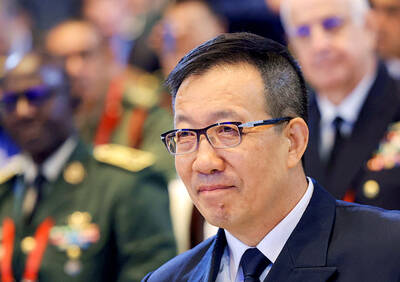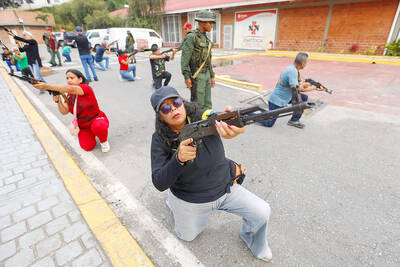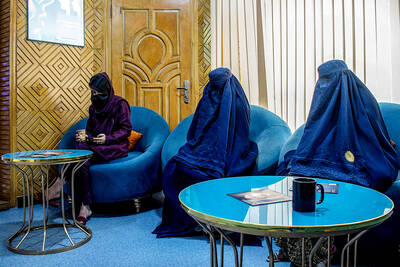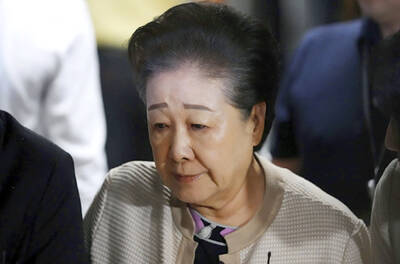Chinese companies this month quietly signed a contract to cooperate in building two nuclear reactors at Pakistan’s Chashma atomic complex, advancing a controversial project that has worried Washington and India.
The China Nuclear Industry Fifth Construction Company and the CNNC China Zhongyuan Engineering Corp, which specializes in foreign nuclear projects, agreed to work together on the third and fourth plants at the Chashma complex, according to a Chinese-language announcement on the Web site of the construction company (www.cnfc.net.cn).
The deal, signed in Shanghai on June 8, confirmed that long-running plans about Chinese help in expanding Chashma are moving forward, despite misgivings in the region and beyond about security and proliferation risks in troubled Pakistan.
A Pakistani government official said there was nothing new in the agreement and that it was part of an ongoing cooperation with China in the peaceful use of nuclear energy.
COOPERATION
“China has long been cooperating with Pakistan for the use of nuclear technology for peaceful purposes and this cooperation is continuing,” the official said.
The pressurized water reactors are “a major cooperative project between China and Pakistan that both governments treat as highly important,” said the company announcement dated the same day as the signing, which received almost no domestic media attention at the time.
The project will “bring Chinese nuclear energy to the world and is significant for once again bearing firm fruit for Sino-Pakistani friendship,” the company statement said.
It did not give any details about the timing and cost of the project. The companies have worked on earlier reactors at Chashma.
Mounting signs that China will proceed with the reactor project in Punjab province have stirred international misgivings, especially in neighboring India and the US. The US said this month it wanted clarification from China on the proposed plants, which have been under planning and deepening negotiation for years.
WEAPONS
Pakistan and India are wary rivals, and both possess nuclear weapons and stay outside the nuclear Non-Proliferation Treaty.
Islamabad has looked to Beijing to counter to Indian influence.
Pakistan also faces severe power shortages. China says its nuclear cooperation with Pakistan is purely peaceful and follows international safeguards.
The proposed nuclear deal may be discussed this week by the Nuclear Suppliers Group (NSG), a body of 46 governments that seek to control access to their nuclear fuel and reactor technology to prevent the spread of atomic weapons.
China and the US are among the NSG members, who will meet in New Zealand.
MISGIVINGS
In 2008, China allowed a nuclear energy agreement between Washington and Delhi to win NSG approval, despite misgivings in Beijing, long a rival of India, and criticism from other capitals that the deal eroded nuclear non-proliferation rules.
China has said that the two proposed reactors “form part of an earlier agreement with Pakistan that predated its NSG membership, thereby denying that the sale would violate NSG guidelines,” said Lora Saalman, an associate in Beijing with the Carnegie Endowment for International Peace, who studies nuclear diplomacy between emerging Asian powers China and India.

BEIJING FORUM: ‘So-called freedom of navigation advocated by certain countries outside the region challenges the norms of international relations,’ the minister said Chinese Minister of National Defense Dong Jun (董軍) yesterday denounced “hegemonic logic and acts of bullying” during remarks at a Beijing forum that were full of thinly veiled references to the US. Organizers said that about 1,800 representatives from 100 countries, including political, military and academic leaders, were in Beijing for the Xiangshan Forum. The three-day event comes as China presents itself as a mediator of fraught global issues including the wars in Ukraine and Gaza. Addressing attendees at the opening ceremony, Dong warned of “new threats and challenges” now facing world peace. “While the themes of the times — peace and development —

Venezuela on Saturday organized a day of military training for civilians in response to the US deployment in the Caribbean, and amid new threats from US President Donald Trump. About a month ago, Washington deployed warships to international waters off Venezuela’s coast, backed by F-35 jets sent to Puerto Rico in what it calls an anti-drug and anti-terrorism operation. Venezuelan Minister of Defense Vladimir Padrino Lopez has accused Washington of waging “undeclared war” in the Caribbean, after US strikes killed over a dozen alleged drug traffickers off his country’s coast. Caracas also accused the US of seeking regime change, and

Decked out with fake crystal chandeliers and velvet sofas, cosmetic surgery clinics in Afghanistan’s capital are a world away from the austerity of Taliban rule, where Botox, lip filler and hair transplants reign. Despite the Taliban authorities’ strict theocratic rule, and prevailing conservatism and poverty in Afghanistan, the 20 or so clinics in Kabul have flourished since the end of decades of war in the country. Foreign doctors, especially from Turkey, travel to Kabul to train Afghans, who equally undertake internships in Istanbul, while equipment is imported from Asia or Europe. In the waiting rooms, the clientele is often well-off and includes men

BRIBERY ALLEGATIONS: A prosecutor said they considered the risk of Hak-ja Han tampering with evidence to be very high, which led them to seek the warrant South Korean prosecutors yesterday requested an arrest warrant for the leader of the Unification Church, Hak-ja Han, on allegations of bribery linked to the country’s former first lady and incitement to destroy evidence. The move came a day after the 82-year-old was questioned over her alleged role in bribing former first lady Kim Keon-hee and a lawmaker. Founded in 1954 by her late husband, Sun Myung Moon, the Unification Church has long been the subject of controversy and criticism, with its teachings centered on Moon’s role as the “second coming” and its mass weddings. Followers are derisively referred to as “Moonies.” However, the church’s